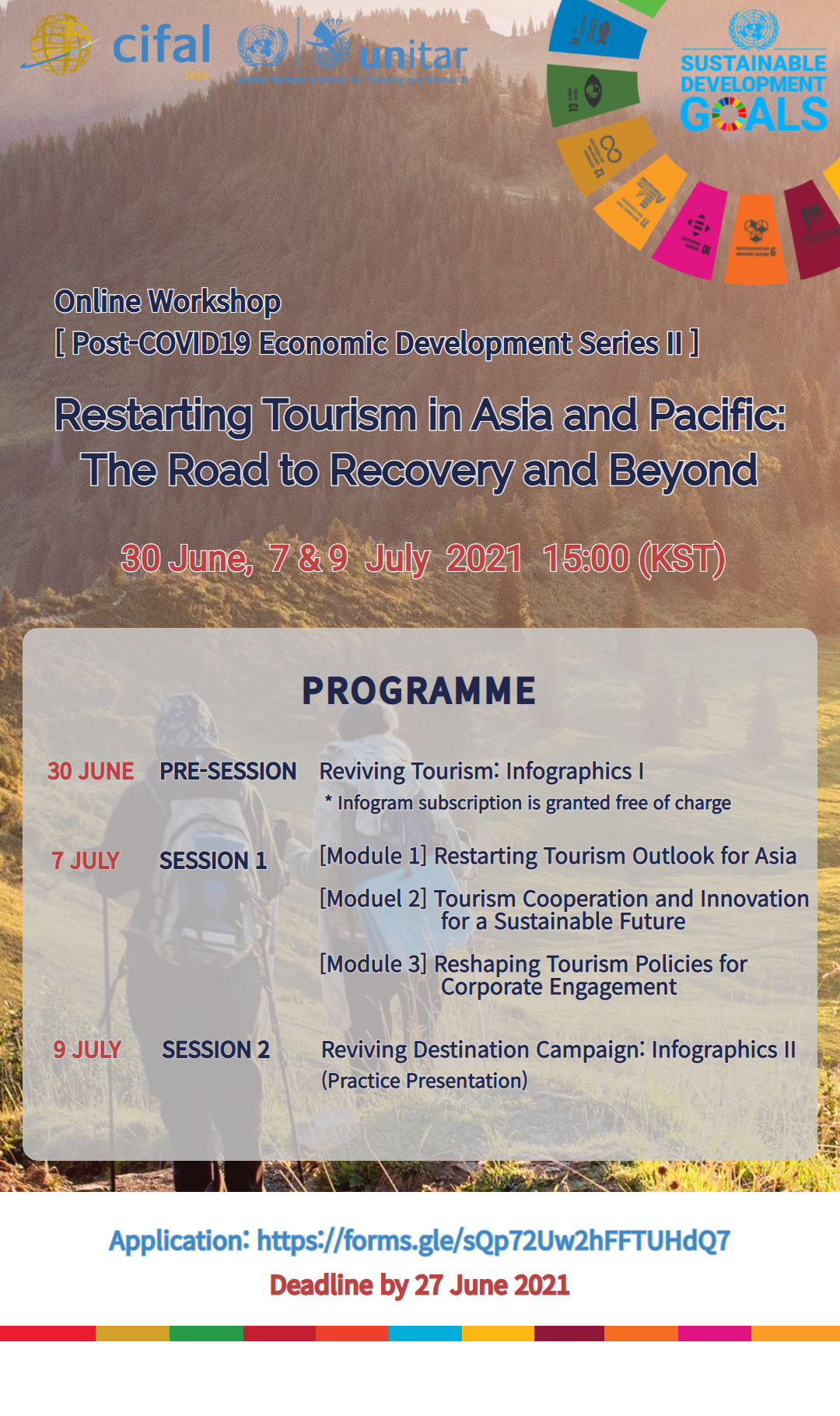Likewise, CIFAL Jeju/JITC has expanded its scope of workshops to include various aspects of economic development, such as sustainable urbanization, tourism, entrepreneurship, rural and agricultural development, smart city, green finance, and so on.

 2022.07.28
2022.07.28
|
[Post-Covid19 Economic Development Series II] Restarting Tourism in Asia and the Pacific: The Road to Recovery and Beyond June 30, July 7 & 9 2021 15:00 (Korean Standard Time, GMT+9) ■ Background The COVID-19 pandemic has hit the tourism economy hard. Domestic tourism is backing up to soften the blow partially, and governments have taken immediate action to restore and reactivate the sector, while protecting jobs and businesses. Many countries are also developing measures to build a more resilient tourism economy in the post COVID-19. These include preparing plans to support the sustainable recovery of tourism, promoting the digital transition and move to a greener tourism system, and rethinking tourism for the future. [1] However, the sector has significantly impacted and will be one of the last to recover, with the ongoing travel restrictions and the global recession.[2]The World Tourism Organization (UNWTO) estimated the 73% drop in worldwide international tourist arrivals recorded in 2020, making it the worst year for the sector.[3]Between January and March 2021 destinations around the world welcomed 180 million fewer international arrivals compared to the first quarter of last year. Asia and the Pacific underwent the lowest levels of activity with a 94% fall in international arrivals over the same period. Europe recorded the second largest decline with -83%, followed by Africa (-81%), the Middle East (-78%) and the Americas (-71%).[4] Furthermore, the scale of job losses is also not yet apparent although government supports have protected workers from the impact of the pandemic. According to the World Travel and Tourism Council (WTTC), up to 174 million jobs were at risk globally in 2020.[5] Especially women, young people, rural communities, indigenous people and informal workers are disproportionately affected – groups that are more likely to be employed in micro or small tourism businesses.[6] Nonetheless, as progress on vaccines has lifted hopes, the road ahead is bright. Growth has rebounded in many parts of the economy and destinations around the world are beginning to reopen for tourism to travelers.[7]But recovery will be uneven across countries, and across sectors. Tourism industry has been slower to bounce back, and travel brands of all sizes are confronting new challenges such as health protocols.[8]Step by step, sharing experiences and insight should help destination organizations of all sizes better plan to attract and safely welcome back visitors. In this regard, this capacity workshop aims at sharing the tourism economy outlook and raising awareness of the challenges and opportunities to rebuild the tourism sector. This event also brings professionals to discuss on driving new business models and destination marketing, exploring new niches and markets, and moving to more sustainable and resilient tourism development models.
■ Event Objectives For the capacity building, this event will: · Offer a venue for knowledge sharing and to discuss regional status and issues of supporting the sustainable recovery of tourism in Asia and the Pacific region. · Provide an opportunity for policy makers and experts to share and exchange their good practices.
■ Learning Objectives After this event, participants will be able to: · Raise awareness of the challenges and opportunities for the recovery of tourism · have the understanding of new business models and innovation, and destination marketing and management toward more sustainable and resilient tourism development
■ Target Audience This online event is open to government officials and personnel from non-profit, civil and private sectors, including focal points for: · Tourism, hospitality and airline industries, smart tourism, and destination management and marketing This event is also open to representatives from the academia, research entities, development agencies and think tanks actively engaged in coordinating and implementing strategies and policies in destination management and marketing. ■ Preliminary Program (web-based)
*Infogram, an infographic design tool, for one-month service is provided free of charge. infogram.com *All sessions will begin at 15:00 (Korean Standard Time, GMT+9) * The above program is subject to change.
■ Application and deadline Submit the application form at https://forms.gle/sQp72Uw2hFFTUHdQ7by 27 June 2021 (Sunday). *Kindly note that only selected applicants will be notified individually. ■ Requirements Selected participants are required to: · submit assignments on time – infographic design · actively engage in the training program · be fluent in written and spoken English
■ Certificate · A Certificate of Completion will be awarded to those who have completed online sessions and fulfilled the required tasks for the program · The participants will be awarded a certificate jointly issued by UNITAR and UNITAR CIFAL Jeju.
*For inquiries, please send an e-mail to Ms.Sungeun Ann at seann.jitc@gmail.com
[1]OECD (2020), OECD Economic Outlook, Volume 2020 Issue 2: Preliminary version, OECD Publishing, Paris, 1 December 2020 [2]Ibid [3] UNWTO, Tourist Numbers Down 83% But Confidence Slowly Rising, 2 June 2021
[4] Ibid
[5] WTTC Press Release, 174 million Travel and Tourism jobs could be lost due to COVID-19 and travel restrictions, 29 October 2020 [6]OECD (2020), OECD Economic Outlook, Volume 2020 Issue 2: Preliminary version, OECD Publishing, Paris, 1 December 2020 [7]Ibid [8]Ibid
|







